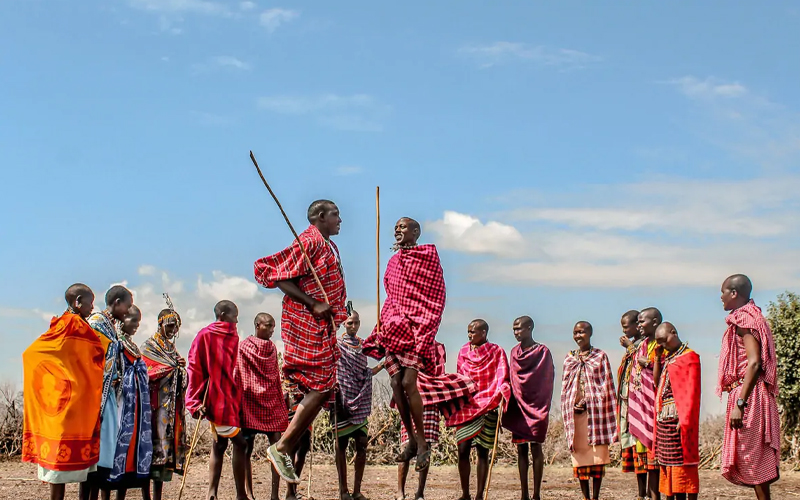Exploring Tanzania’s Culture in 2025 Sustainable Tourism
Tanzania is more than just a safari destination; it’s a melting pot of vibrant cultures, ancient traditions, and forward-thinking sustainable tourism initiatives. As the world embraces cultural preservation and responsible travel, 2025 is the perfect time to delve deeper into Tanzania’s rich cultural tapestry. Let’s explore how Tanzania’s unique traditions, diverse ethnic groups, and eco-conscious tourism are shaping its cultural experience in 2025.
The Heart of Tanzanian Culture
Tanzania’s culture is as diverse as its stunning landscapes. With over 120 ethnic groups, the country is a living museum of traditions, languages, and lifestyles that have been preserved for centuries. From the proud Maasai warriors of the savannah to the coastal Swahili communities, each group contributes to the nation’s cultural identity.
1. The Maasai: Guardians of Tanzania’s Traditions
The Maasai people are perhaps Tanzania’s most recognizable ethnic group, known for their striking red shukas (robes), intricate beadwork, and pastoralist lifestyle. In 2025, the Maasai continue to embrace their traditions while adapting to modern challenges.
- Maasai Ceremonies and Rituals
Visitors can witness unique Maasai ceremonies like the Eunoto, a rite of passage for young warriors, or learn about their intricate storytelling traditions that preserve history and wisdom.
- A Visit to Maasai Villages
Sustainable tourism initiatives have introduced respectful and educational Maasai village visits, where travelers can experience:
- Traditional dances and songs.
- Workshops on Maasai bead-making.
- Insight into their cattle-reliant lifestyle.
2. Swahili Culture: The Essence of Coastal Tanzania
The Swahili people, who inhabit Tanzania’s coastline and islands, represent a fusion of African, Arab, and Indian influences. In 2025, Swahili culture continues to thrive in Zanzibar and coastal towns like Bagamoyo and Tanga.
- The Legacy of Stone Town
Zanzibar’s Stone Town, a UNESCO World Heritage Site, is a treasure trove of Swahili culture. Highlights include:
- Exploring ancient Arab dhows and the spice trade history.
- Sampling Swahili dishes like biryani and nyama choma at local markets.
- Traditional Music and Festivals
Events like the Sauti za Busara Festival celebrate Swahili music, featuring taarab, a genre that blends African rhythms with Arabic influences.
3. The Hadzabe and Datoga: Tanzania’s Indigenous Tribes
In northern Tanzania, near Lake Eyasi, live two of Tanzania’s most fascinating indigenous groups: the Hadzabe, a hunter-gatherer tribe, and the Datoga, skilled blacksmiths and pastoralists.
- Life With the Hadzabe
Visitors can join the Hadzabe on hunting expeditions, learn about their click-language, and experience a lifestyle untouched by modernity.
- Datoga Blacksmithing
The Datoga’s craftsmanship is showcased in their metalwork, often used by neighboring tribes. Participating in workshops offers hands-on insight into their creative processes.
Sustainable Tourism and Cultural Preservation in 2025
As tourism evolves post-climate action, Tanzania has embraced sustainable tourism practices that respect local communities and preserve cultural heritage.
1. Community-Based Tourism
Tanzania’s focus on community-based tourism ensures that local people benefit directly from travelers. Popular initiatives include:
- Staying at community-owned lodges.
- Participating in village tours to support local economies.
- Learning Swahili cooking techniques from village chefs.
2. Conservation and Culture
National parks and conservancies like the Ngorongoro Conservation Area work closely with indigenous tribes to protect both wildlife and cultural heritage. The coexistence of the Maasai and wildlife in Ngorongoro is a prime example of this harmonious balance.
Tanzanian Festivals in 2025: Celebrating Diversity
Tanzania’s calendar is packed with festivals that highlight its cultural vibrancy. Here are some to watch out for in 2025:
- Unification Day (April 26): Celebrates the union of Tanganyika and Zanzibar, with parades and cultural showcases.
- Mwaka Kogwa Festival (July): A unique Zanzibar celebration marking the Persian New Year, featuring mock fights and feasts.
- Nane Nane (August 8): A national agricultural fair highlighting Tanzania’s rural culture and farming innovations.
Swahili Cuisine: A Cultural Delight
Tanzanian cuisine is a reflection of its diverse cultures, with Swahili cuisine taking center stage. Visitors can enjoy dishes like:
- Pilau: Spiced rice infused with cinnamon and cardamom.
- Chapati: A soft, flaky flatbread served with stews.
- Zanzibar Pizza: A savory and sweet delicacy you won’t find anywhere else.
Cooking classes offered in Zanzibar and Dar es Salaam allow travelers to bring home the flavors of Tanzania.
Cultural Etiquette: What to Know Before You Go
Tanzania’s culture is warm and welcoming, but understanding local customs enhances the travel experience. Here are some tips:
- Greetings: Always greet locals with a handshake or a friendly “Habari za leo?” (“How is your day?”).
- Dress Modestly: Especially in rural areas and Zanzibar, where Islamic traditions are observed.
- Respect Elders: Tanzanian culture places great emphasis on showing respect to elders.
Why Tanzania in 2025?
Tanzania is a cultural treasure trove, blending ancient traditions with modern sustainability efforts. By choosing to explore Tanzania’s culture in 2025, you’re not only enriching your travel experience but also supporting the preservation of these traditions for generations to come.
FAQs
1. What makes Tanzania’s culture unique?
Tanzania’s cultural diversity stems from its 120+ ethnic groups, each with its own language, traditions, and customs.
2. Can I visit Maasai villages in Tanzania?
Yes, respectful and educational Maasai village visits are offered as part of sustainable tourism initiatives.
3. What is community-based tourism in Tanzania?
Community-based tourism ensures local communities benefit from tourism through activities like village tours and community-run lodges.
4. Is it safe to interact with local tribes?
Absolutely, as long as you follow ethical guidelines and work with reputable tour operators.
5. What are the must-visit cultural sites in Tanzania?
Stone Town, Ngorongoro Conservation Area, and Lake Eyasi are top destinations for cultural exploration.
Explore Tanzania’s Wonders!
Discover:
- Mount Kilimanjaro – Embark on an epic adventure to Africa’s highest peak or explore its scenic foothills.
- Day Trips – Perfect for quick escapes, including cultural experiences and wildlife encounters.
- Lake Manyara Day Trip – Witness diverse wildlife, including flamingos and tree-climbing lions, in this picturesque park.
- Lake Manyara National Park – A gem for birdwatching and game drives amidst lush landscapes.
- Mto wa Mbu Culture Tour – Immerse yourself in a vibrant mix of Tanzanian cultures, local cuisines, and artisanal crafts.
Start your Tanzanian adventure today!

